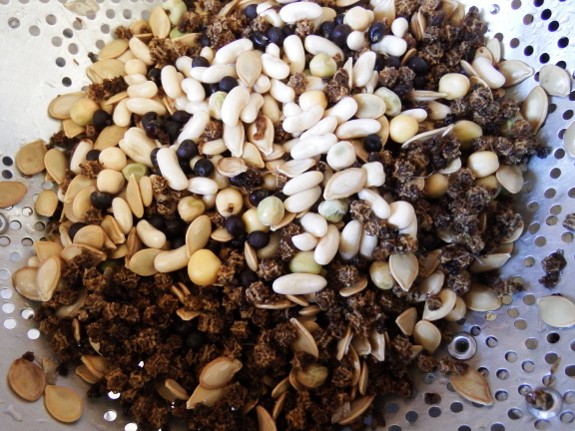
Sprouting old garden seeds for animals

While cleaning up my unruly bookshelf,
I discovered several large containers of homegrown vegetable seeds from
2012. I planted some in 2013, kept the containers as backup for 2014
just in case my next round of seeds didn't work...but here it is 2015
and the seeds are still there. So I decided to sprout them as a special
treat for the goats and chickens.
With large seeds like
this, my current favorite method for mass-sprouting is to soak the seeds
in water for 12 to 24 hours, then pour them out in a colander and leave
them in the sink. Whenever I think about it (usually two or three times
a day), I splash on some fresh water and shake the colander around a
bit. In our cool kitchen, mung beans sprout fully in about a week using
this method, and hopefully my current combination of green beans, peas,
swiss chard, summer squash, and okra will do the same. I'll keep you
posted once I find out if our livestock appreciate the extra attention.
As a side note, I did a
little research to determine whether any vegetable seeds are poisonous,
and found very little data. I'm operating under the assumption that
seeds we consume as part of the vegetable (beans, summer squash, peas)
are edible even when mature and dried, while plants that we eat as
greens (swiss chard) are also edible in the sprout stage. I might steer
clear of feeding livestock tomato sprouts since their foliage is
semi-poisonous and I definitely wouldn't sprout apple or peach seeds for
animals, but otherwise, my guess is that most vegetable seeds are safe.
I'd be curious to hear from anyone who has further data, though!
Want more in-depth information? Browse through our books.
Or explore more posts by date or by subject.
About us: Anna Hess and Mark Hamilton spent over a decade living self-sufficiently in the mountains of Virginia before moving north to start over from scratch in the foothills of Ohio. They've experimented with permaculture, no-till gardening, trailersteading, home-based microbusinesses and much more, writing about their adventures in both blogs and books.
Want to be notified when new comments are posted on this page? Click on the RSS button after you add a comment to subscribe to the comment feed, or simply check the box beside "email replies to me" while writing your comment.
- Remove comment
- Remove comment
